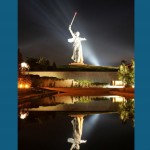
A RAILWAY STATION AS A BOOK AND A HERE-SPACE
ВОКЗАЛ КАК КНИГА И ЗДЕСЬ-ПРОСТРАНСТВО
Keywords: railway station; socio-cultural locus; semiotics of culture; mythopoetics; architecture; Poland; Germany; Austria-Hungary, Russia; nineteenth century; twentieth century;
The article contains cultural, semiotic and mythopoethic characteristics of a railway station as a socio-cultural space (locus). The aim of the study is to reveal the symbolic and imaginative mentalgenerating mechanisms of appearance of myphopoetic images accompanying railway stations and their anchoring in cultural memory. The author studies the cases of German, Austrian and Russian railway stations built on the territory of a divided Poland in the 19th – the early 20th century. The author concludes that in the age of historicism supremacy a railway station, being an important and a semantically valent genre of social and cultural space (here-space), had been often used as a substitute and a metaphor for a popular book telling about the main dominants of the national culture.
More...

